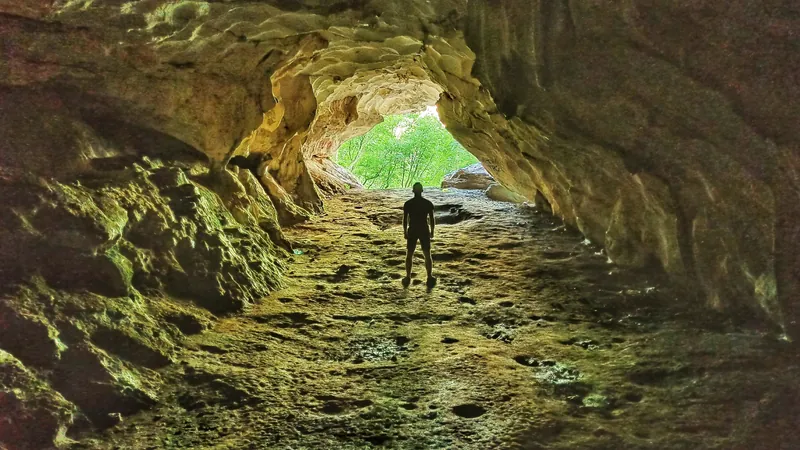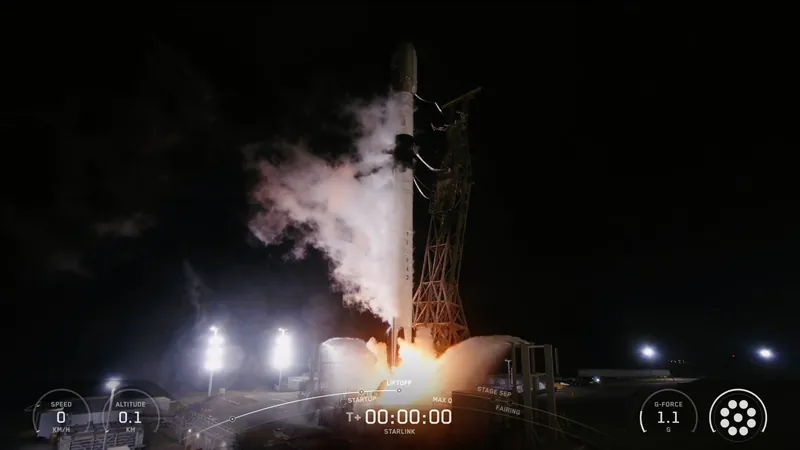
Ancient DNA: The Secret Weapon That Helped Early Americans Thrive!
2025-08-21
Author: Wei Ling
Imagine making a perilous trek across icy expanses, with only the unknown ahead. Thousands of years ago, ancient humans did just that, crossing the Bering Strait into the uncharted territory of the Americas. But what if I told you they brought along an astonishing gift from an extinct relative?
A groundbreaking study from the University of Colorado Boulder reveals that these early nomads carried a piece of DNA inherited from an extinct hominin species known as the Denisovans. This ancient genetic material may have played a crucial role in helping humans adapt to their new environment.
The findings, unveiled in the prestigious journal Science, emphasize a remarkable evolutionary leap. Lead author Fernando Villanea, an assistant professor at CU Boulder, noted, "It shows an amount of adaptation and resilience within a population that is simply amazing."
Unveiling the Mystery of the Denisovans
Denisovans, who roamed from modern-day Russia to Oceania, went extinct tens of thousands of years ago. However, much about them remains shrouded in mystery. The first Denisovan was identified just 15 years ago from a fragment of bone found in a Siberian cave. While scientists understand their genomes and biological traits, their physical appearance remains largely unknown.
"We know more about their genomes and how their body chemistry behaves than we do about what they looked like," Villanea remarked.
The Genetic Connection
Research has shown that Denisovans interbred with both Neanderthals and early humans, leaving a lasting impact on our biology. To dig deeper into these connections, Villanea and his team focused on a gene called MUC19, vital for immune system function. What they discovered was astonishing: individuals with Indigenous American ancestry are significantly more likely to possess a Denisovan variant of this gene compared to other populations. This ancient genetic link may have been a lifeline for early Americans, helping them thrive in the diverse ecosystems of North and South America.
The Enigmatic MUC19 Gene
Villanea described MUC19 as mysterious, a member of a select group of genes responsible for producing mucins—proteins that create mucus, vital for protecting tissues from pathogens. He explained, "It seems like MUC19 has a lot of functional consequences for health, but we're only beginning to understand these genes."
Interestingly, Denisovans themselves carried a distinct version of the MUC19 gene, further emphasizing the genetic interactions that shaped early human populations.
Discoveries from Ancient Genomes
In their research, the scientists examined genomes from modern populations across Mexico, Peru, Puerto Rico, and Colombia, where Indigenous ancestry is prominent. Astonishingly, they found that one in three Mexican individuals carry the Denisovan variant of MUC19, especially within their Indigenous heritage. Comparatively, only 1% of Central Europeans possess this variant!
Even more intriguing was the discovery that the Denisovan gene is surrounded by Neanderthal DNA, creating a fascinating genetic sandwich.
A Journey Through Time
So how did this genetic exchange occur? Villanea hypothesizes that before humans ventured into the Americas, Denisovans had already interbred with Neanderthals, passing on the MUC19 gene to their offspring. As humans began to migrate to the Americas, they inherited this Denisovan DNA through further interbreeding with Neanderthals. This is the first time scientists have traced DNA migration from Denisovans to Neanderthals and then to humans!
Adapting to New Challenges
As these early humans settled in the Americas, natural selection favored the spread of the Denisovan MUC19 variant. But why did it flourish in the Americas and not elsewhere? Villanea speculates that the first settlers faced unprecedented challenges, from unfamiliar foods to new diseases. Denisovan DNA could have provided additional tools to help them meet these challenges head-on.
"They had to find innovative ways to hunt, farm, and adapt technologically," he said, noting that over thousands of years, their bodies were also evolving.
Future Discoveries Await
Looking ahead, Villanea plans to investigate the impact of differing MUC19 variants on modern health. This research stands as a powerful testament to the intricate and fascinating story of human evolution and adaptation.


 Brasil (PT)
Brasil (PT)
 Canada (EN)
Canada (EN)
 Chile (ES)
Chile (ES)
 Česko (CS)
Česko (CS)
 대한민국 (KO)
대한민국 (KO)
 España (ES)
España (ES)
 France (FR)
France (FR)
 Hong Kong (EN)
Hong Kong (EN)
 Italia (IT)
Italia (IT)
 日本 (JA)
日本 (JA)
 Magyarország (HU)
Magyarország (HU)
 Norge (NO)
Norge (NO)
 Polska (PL)
Polska (PL)
 Schweiz (DE)
Schweiz (DE)
 Singapore (EN)
Singapore (EN)
 Sverige (SV)
Sverige (SV)
 Suomi (FI)
Suomi (FI)
 Türkiye (TR)
Türkiye (TR)
 الإمارات العربية المتحدة (AR)
الإمارات العربية المتحدة (AR)